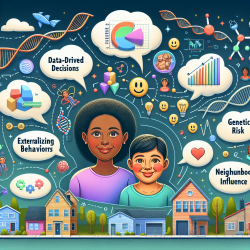Introduction
In the heart of adversity, where trauma and displacement intertwine, the power of education emerges as a beacon of hope. The research article "Gender-Related Challenges in Educational Interventions with Syrian Refugee Parents of Trauma-Affected Children in Turkey" sheds light on the critical role of educational interventions in supporting Syrian refugee children. As practitioners, understanding and implementing the findings from this research can significantly enhance the effectiveness of our interventions.
Understanding the Gendered Challenges
The study highlights the profound impact of gender-related challenges on educational interventions. Syrian refugee experiences are highly gendered, influencing how trauma is perceived and addressed. The research identifies domestic violence, sexual violence, and the constructs of masculinity as significant barriers that hinder the implementation of effective educational programs.
For practitioners, recognizing these gendered dynamics is crucial. Understanding that trauma affects individuals differently based on gender can guide us in tailoring interventions that are sensitive to these differences. By doing so, we can create a more inclusive and supportive environment for both parents and children.
Implementing Research Findings
To improve outcomes for trauma-affected children, practitioners can adopt several strategies based on the research findings:
- Integrate Parent Trauma Support: Incorporate trauma support for parents within educational interventions. By addressing parental trauma, we empower parents to create stable and nurturing environments for their children.
- Create Safe Spaces: Establish safe spaces where parents can discuss their trauma and challenges. This fosters a supportive community and enhances the efficacy of educational programs.
- Advocate for Policy Changes: Support policies that protect refugees from deportation when accessing support services. This ensures that families can seek help without fear, promoting a healthier environment for children.
Encouraging Further Research
While the research provides valuable insights, it also highlights the need for ongoing exploration. Practitioners are encouraged to engage in further research to deepen our understanding of gendered challenges in educational interventions. Collaborative efforts with organizations like A Global Voice for Autism can lead to innovative solutions that address the unique needs of refugee populations.
Conclusion
As we strive to create positive outcomes for Syrian refugee children, let us be guided by data-driven insights and a commitment to understanding the complexities of trauma and gender. By implementing research findings and advocating for systemic changes, we can transform educational interventions into powerful tools for healing and empowerment.
To read the original research paper, please follow this link: Gender-Related Challenges in Educational Interventions with Syrian Refugee Parents of Trauma-Affected Children in Turkey.










